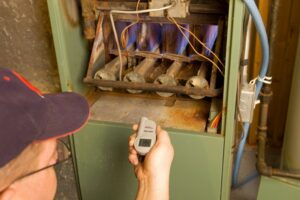Perhaps you read the title of this blog post and are now wondering, “Wait, is my furnace hazardous?”
The answer is, “No, not inherently.”
The problem is that many homeowners invest in a gas-powered furnace, but not the maintenance and care that goes into safely operating it. Or they’re not aware that a gas-powered furnace can start experiencing problems with age that may lead to potentially hazardous consequences. One consequence in particular that we’re going to talk about today is a cracked heat exchanger.
First Off, What Is a Heat Exchanger?
This is a component that is vital to the functionality of your furnace. It’s what enables your furnace to warm the air that travels throughout your air ducts to bring you comfort in your living space. When the burners of your furnace cycle on, they generate hot combustion gas, and that gas is collected inside of the heat exchanger, which is a small metal chamber that comes together like a clamshell.
The hot combustion gases within the heat exchanger heat up the metal. Then, the blower fan of your furnace comes on and sends air around that exchanger, which is how it picks up the heat to bring into your home. Throughout this process, there is no contact between the gases and your indoor air, as the combustion byproducts in the heat exchanger get vented out of the system through a flue to release the gas harmlessly into the air.
The Problem with a Cracked Heat Exchanger
Over time, corrosion due to old age can damage the structural integrity of your furnace, including the heat exchanger. The heat exchanger can start to develop small fissures at its connection point. These fissures will be practically invisible to the naked eye, especially when the heater isn’t running.
What happens is that the metal walls of the heat exchanger expand and contract as it heats up and cools back down. So when it does cool back down, the fissures or cracks shrink down with it but open up when your furnace cycles back on.
The problem with this is that it introduces combustion gases into your indoor air. The most harmful of these gases is carbon monoxide or CO. The risk of CO poisoning is a very real danger for homeowners, leading to illness and in very serious cases even fatalities.
Does This Mean You Shouldn’t Have a Gas-Powered Furnace?
No, this doesn’t mean you shouldn’t have a gas-powered heating system! It just means that you’ll want to stay on top of your annual furnace maintenance appointments to ensure that everything is in great shape. As a precaution, it’s also a good idea to invest in CO detectors for your home–actually, in some jurisdictions, it’s legally required to have these in your home, along with smoke detectors.
Contact us today to schedule your next maintenance session and please don’t hesitate to reach out with any questions or concerns you have about your furnace, gas or electric.
At Dalton Plumbing, Heating, Cooling, Electric and Fireplaces, Inc., your comfort is our promise! To set up a heating service appointment, give us a call at the number above, email customerservice@daltonphc.com or schedule an appointment online.

